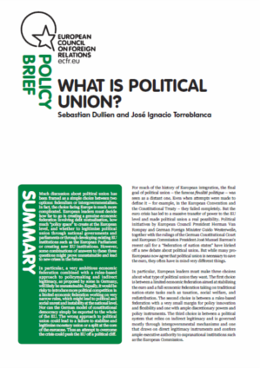What is political union?
Three choices for a more integrated Europe
The euro crisis has led to a massive transfer of power to the EU level, and made political union a genuine possibility. But although pro-Europeans now agree that political union is necessary to save the euro, they often have in mind very different things.
A new ECFR paper by Sebastian Dullien and José Ignacio Torreblanca – “What is political union?” – argues that European leaders must make three choices about the type of political union they want:
- A limited economic federation aimed at stabilising the euro, or a full economic federation that takes on member state competences such as taxation, social welfare, and distribution?
- A rules-based federation with a very small margin for policy flexibility, or one with wide-ranging discretionary powers and policy instruments?
- A political system reliant upon indirect legitimacy, governed through intergovernmental mechanisms, or one drawing on direct legitimacy conferring executive authority to supranational institutions such as the European Commission?
The authors warn that a balance must be struck that allows any more integrated EU to be flexible while still based upon rules, and is also able to claim legitimacy for its actions.
“If leaders make the wrong choices the result may be unsustainable and lead to more crises. A failure to balance these three dimensions could create havoc in Europe.” José Ignacio Torreblanca
“A stereotypical “German vision” for political union will not work. It is too inflexible and might push the EU off the political cliff.”Sebastian Dullien
The European Council on Foreign Relations does not take collective positions. ECFR publications only represent the views of their individual authors.



